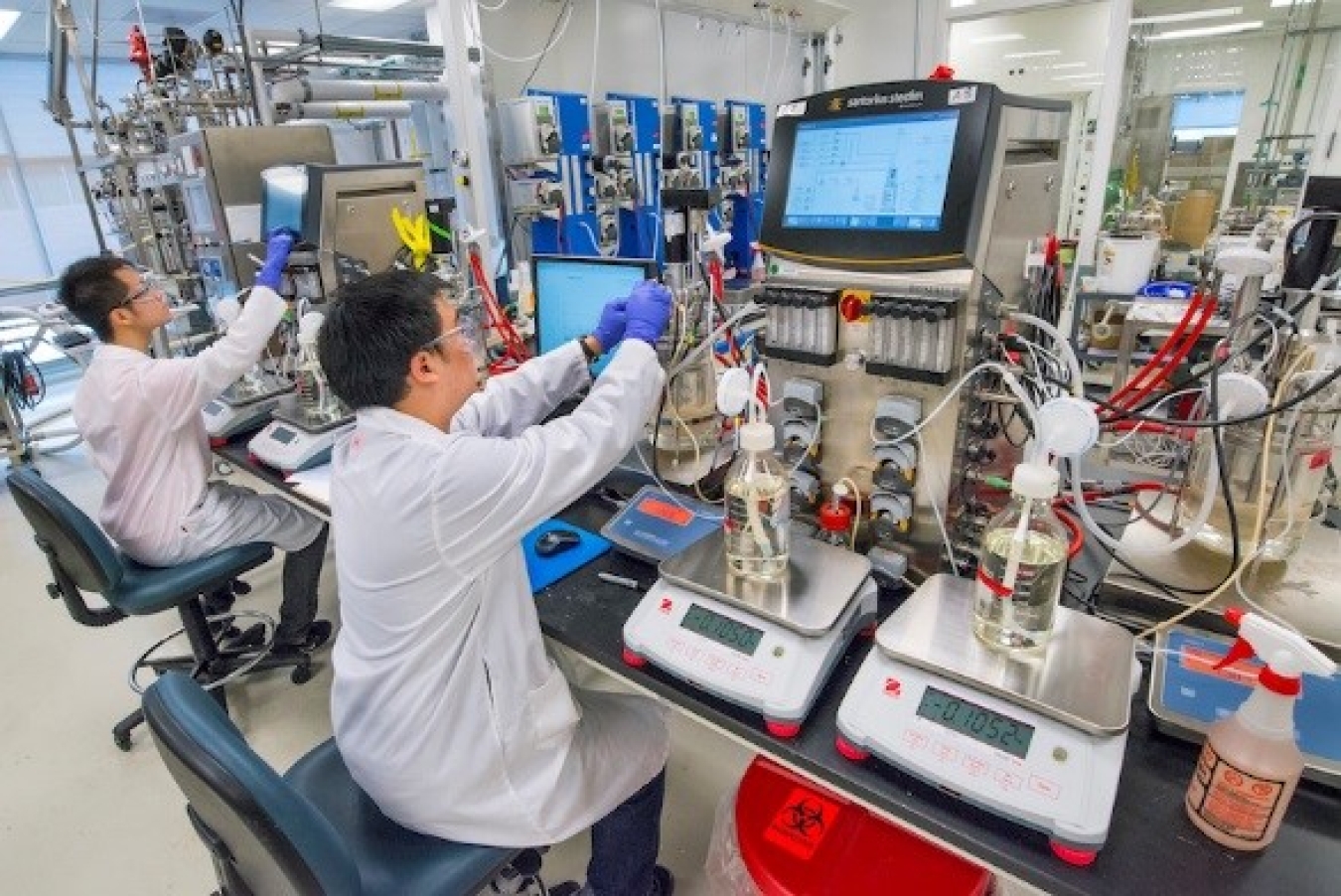Bioprose Blog: Beyond Bioenergy—BETO Funding Ensures Our Nation Is Competitive in an Emerging Bioeconomy
August 17, 2017Author: David Babson, Technology Manager, Conversion Research and Development
Read David's bio ►
Meet the other bloggers ►
Return to Bioprose blog ►
Bioprose Blog
Having just started my job as a technology manager last year, I am new to the Bioenergy Technologies Office (BETO). When I joined BETO, I recognized that there was a substantial need to tackle emissions from the transportation sector both by reducing the amount of fuel we use and by making the fuel we do use both domestically derived and cleaner, and thus I was excited to join one of our nation’s premier sponsors of advanced biofuels research and innovation. What I didn’t fully realize then was that BETO’s technology focus and its support for innovative research extends well beyond bioenergy and biofuel, and its benefits go well beyond mitigating emissions.
In fact, for many reasons, BETO could be thought of as the Bioeconomy Technologies Office because BETO’s broader technology portfolio is delivering more than just cleaner fuels—it is supporting biotechnologies that are leveraging our domestic biomass resources to potentially produce better bioproducts and a more competitive U.S. economy, while identifying ways to reduce the amount of foreign fossil fuels we need in the first place. BETO is working to ensure that our nation is competitive in the future bioeconomy by supporting innovations that will make its emergence and evolution both clean and efficient.
The bioeconomy is kind of a big deal.

Renewable biomass and jobs. Domestic biomass not only offers the starting material to produce fuels and products for our advanced bioeconomy, it ensures reliable jobs up and down the supply chain.
Although there are differing definitions for both “biotechnology” and “bioeconomy,” the bioeconomy broadly encompasses the economic activity associated with biotechnology-enabled products and the use of biomass resources. And the bioeconomy is kind of a big deal. A recent analysis reported in Nature concluded that U.S. revenues from the bioeconomy amounted to more than $324 billion in 2012. There is no doubt that the biotech sector is large and growing larger. In fact, the Nature study identified substantial growth in biotech sectors and found that the true size of the bioeconomy is being masked by attributing its output to broader sectors of the economy.
It could be argued that the boundaries reported in the paper are too conservative, focusing narrowly on the revenues associated with biotech subsectors, such as biological drugs, industrial products, and biotech crops and seeds. Indeed, the full scope of the bioeconomy extends up and down the biomass supply chain, from farmers and forest managers, through the biotech subsectors and biorefiners, to the consumers of bio-derived fuels, materials, and products. In fact, BETO recognizes the potential of the bioeconomy to become a central feature of our nation’s economy, not a subset of it, and BETO is working to ensure it is as robust and efficient as possible.
The bioeconomy is a big deal for the United States.
Our nation is fortunate enough to have extensive agricultural and forest biomass resources that, if managed sustainably, could serve as a continuous driver for economic prosperity. The vitality of our bioeconomy, and, by extension, our entire domestic economy, is not a matter of finite circumstance. A plethora of seasonal and perennial crops can offer a continuous supply of renewable biomass feedstock for the production of renewable fuels, products, and materials. The continuous and stable production of renewable feedstock stands in contrast to traditional finite petroleum and fossil feedstocks, which are subject to depletion, and exposure to volatility due to geopolitical pressures.
Our domestic economy can be buoyed by valuing renewable resources relative to finite ones. And since biomass resources have the potential to provide a stable and renewable feedstock, it is critical that we work to ensure that our biomass resources can be efficiently produced and converted into the valuable fuels, products, and materials necessary for a robust economy. This is precisely what BETO does.
Thinking big for the bioeconomy.

Cutting-edge biotechnology. BETO supports research to ensure that the conversion and use of biomass resources proceed efficiently. These efforts provide jobs and opportunities across the supply chain from rural farms to urban tech centers.
BETO’s strategic programs are structured to de-risk technical challenges along the entire biomass supply chain, and its funded efforts represent big thinking in both the short and long term. Traditional focuses on biofuels and bioenergy have been expanded to include the energy and carbon efficiency of biomass conversion, as well as bioproducts, biochemicals, and biomaterials.
Recent programmatic efforts have been initiated to improve the sustainability and economics of biomass production, the agility of biological platform engineering, the catalytic upgrading of biointermediates, and the efficient carbon cycling of wastes. These initiatives are addressing the technical challenges associated with evolving a clean and efficient bioeconomy, and BETO is on the front lines of characterizing and understanding the emerging bioeconomy. In fact, BETO’s sustainability assessments and economic analyses are informing how the bioeconomy is perceived and are helping to direct near-term funding in research and development. BETO is also analyzing – over a long time horizon – technologies and strategies that would leverage excess renewable power to enhance both biomass conversion efficiency and atmospheric carbon cycling.
Finally, while BETO works to ensure that renewable fuels can be produced to meet critical demands for liquid fuel, its efforts to improve the efficiency of the entire biomass supply chain, and indeed the entire bioeconomy, will ensure our economy as a whole is more efficient—requiring less energy and fuel to begin with. BETO’s immediate as well as short- and long-term strategic plans are designed to anticipate and direct emerging trends in biotechnology and the broader bioeconomy, which will continue to allow this office to enable the United States to maintain its competitive edge in the future.


